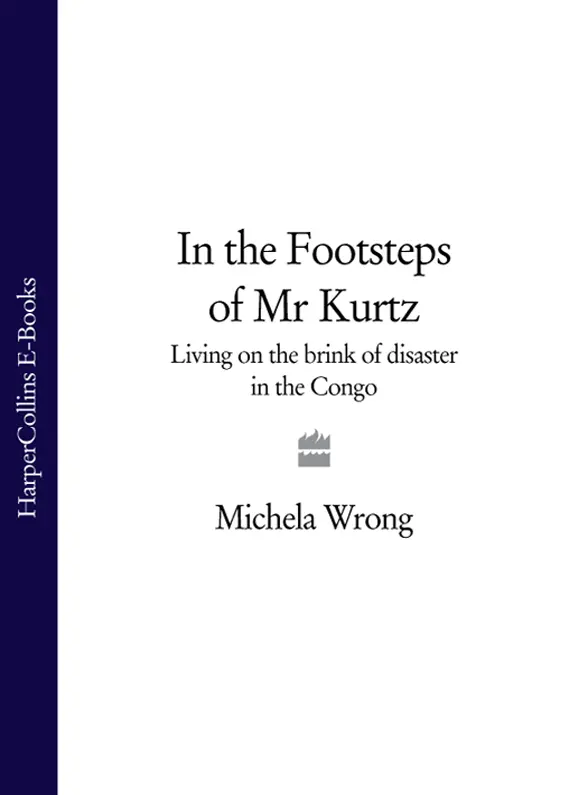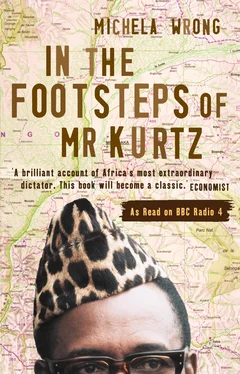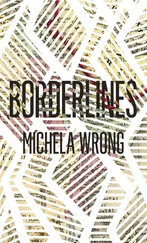
In the Footsteps of Mr Kurtz
LIVING ON THE BRINK OF DISASTER
IN THE CONGO
Michela Wrong

First published in Great Britain in 2000 by Fourth Estate
A division of HarperCollins Publishers Ltd 1 London Bridge Street London SE1 9GF www.harpercollins.co.uk
Copyright © Michela Wrong, 2000
The right of Michela Wrong to be identified as the author of this work has been asserted by her in accordance with the Copyright, Designs and Patents Act 1988
A catalogue record for this book is available from the British Library
All rights reserved under International and Pan-American Copyright Conventions. By payment of the required fees, you have been granted the nonexclusive, nontransferable right to access and read the text of this ebook onscreen. No part of this text may be reproduced, transmitted, downloaded, decompiled, reverse engineered, or stored in or introduced into any information storage and retrieval system, in any form or by any means, whether electronic or mechanical, now known or hereinafter invented, without the express written permission of HarperCollins e-books.
HarperCollinsPublishers has made every reasonable effort to ensure that any picture content and written content in this ebook has been included or removed in accordance with the contractual and technological constraints in operation at the time of publication.
Source ISBN: 9781841154220
Ebook Edition © JUNE 2012 ISBN 9780007382095
Version: 2019-01-14
To Michael Holman , who made sure the book got written
COVER
TITLE PAGE
COPYRIGHT
DEDICATION
INTRODUCTION
CHAPTER ONE You can check out any time you like, but you can never leave
CHAPTER TWO Plaything for a king
CHAPTER THREE Birth of the Leopard
CHAPTER FOUR Dizzy worms
CHAPTER FIVE Living above the shop
CHAPTER SIX A nation on Low Batt
CHAPTER SEVEN Never naked
CHAPTER EIGHT The importance of being elegant
CHAPTER NINE I get by with a little help from my friends
CHAPTER TEN A folly in the jungle
CHAPTER ELEVEN The night the pink champagne went flat
CHAPTER TWELVE The Inseparable Four
CHAPTER THIRTEEN Nappies on the floor
CHAPTER FOURTEEN Ill-gotten gains
EPILOGUE
BIBLIOGRAPHY
GLOSSARY
INDEX
ACKNOWLEDGEMENTS
ABOUT THE AUTHOR
ABOUT THE PUBLISHER
‘He won’t be forgotten. Whatever he was, he was not common. He had the power to charm or frighten rudimentary souls into an aggravated witch-dance in his honour; he could also fill the small souls of the pilgrims with bitter misgivings: he had one devoted friend at least, and he had conquered one soul in the world that was neither rudimentary nor tainted with self-seeking. No; I can’t forget him.’
Heart of Darkness —JOSEPH CONRAD
The feeling struck home within seconds of disembarking.
When the motor-launch deposited me in the cacophony of the quayside, engine churning mats of water hyacinth as it turned to head back across the brown expanse of oily water that was the River Zaire, I was hit by the sensation that so unnerves first-time visitors to Africa. It is that revelatory moment when white, middle-class Westerners finally understand what the rest of humanity has always known – that there are places in this world where the safety net they have spent so much of their lives erecting is suddenly whipped away, where the right accent, education, health insurance and a foreign passport – all the trappings that spell ‘It Can’t Happen to Me’ – no longer apply, and their well-being depends on the condescension of strangers.
The pulse of apprehension drummed as I stuffed my clothes back into the ageing suitcase that had chosen the river crossing between Brazzaville and Kinshasa as the moment to split at the seams, transforming me into a truly African traveller. It quickened as a sweating young British diplomat signally failed to talk our way through the red tape and a chain of hostile policemen picked through the intimacies of my luggage, deciding which bits to keep. It subsided as we emerged from our three-hour ordeal, a little the lighter, finally crossing the magic line separating the customs area from the city.
But in truth, the quiet thud of fear would be there throughout my time in Zaire, whether I was drinking a cold Primus beer in the bustling Cité or taking tea in the green calm of a notable’s patio. This ominous awareness of a world of infinite, sinister possibilities had become one of the dominant characteristics of the nation led by the man who started life as plain Joseph Désiré Mobutu, cook’s son, but reinvented himself as Mobutu Sese Seko Kuku Ngbendu Wa Za Banga, ‘the all-powerful warrior who goes from conquest to conquest, leaving fire in his wake’.
By the mid-1990s, Mobutu had become more noticeable by his absence than his presence, a tall, gravel-voiced figure glimpsed occasionally at official ceremonies and airport walkabouts in Kinshasa, or fielding hostile questions at a rare press conference in France with a sardonic politeness that hinted at huge world-weariness. Rattled by the army riots that had twice devastated his cities, belatedly registering the extent to which he was hated, he had withdrawn from a resentful capital to the safety of Gbadolite, his palace in the depths of the equatorial forest, to nurse his paranoia.
His impassive portrait, decked in comic-opera uniform, kept watch on his behalf, glowering from banks, shops and reception halls. ‘Big Man’ rule had been encapsulated in one timeless brand: leopardskin toque, Buddy Holly glasses and the carved cane so imbued with presidential force mere mortals, it was said, could never hope to lift it. He liked to be known as the Leopard, and the face of a roaring big cat was printed on banknotes, ashtrays and official letterheads. But to a population that had once hailed him as ‘Papa’, he was now known as ‘the dinosaur’, a tribute to how sclerotic his regime had become. Certainly, on a continent of dinosaur leaders, of Biya and Bongo, Mugabe and Moi, he rated as a Tyrannosaurus Rex of the breed, setting an example not to be followed. No other African autocrat had proved such a wily survivor. No other president had been presented with a country of such potential, yet achieved so little. No other leader had plundered his economy so effectively or lived the high life to such excess.
Preyed on by young men with Kalashnikovs, its administration corroded by corruption, a nation the size of Western Europe had fallen off the map of acceptable destinations. My battered copy of the Belgian Guide Nagel, picked up in a Paris bookshop, described Kinshasa as a modern capital ‘boasting all the usual attributes of Europe’s great cities’ and encouraged the tourist to explore its museums, monuments and ‘indigenous quarters’. But that had been in 1959, when the world was a white man’s oyster. Kinshasa was now a stop bypassed even by hardened travellers, where airlines avoided leaving their planes overnight for fear of what the darkness would bring. A hardship posting for diplomats, boycotted by the World Bank and IMF, it was a country every resident seemed determined to abandon, if only they could lay their hands on the necessary visa.
Читать дальше














